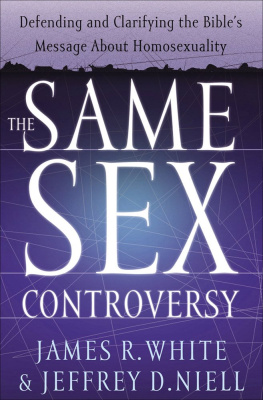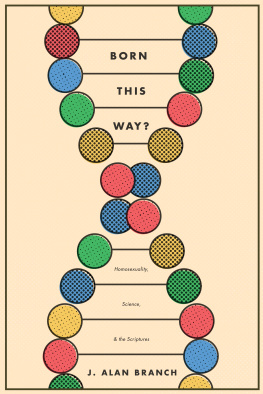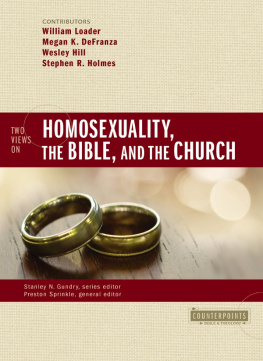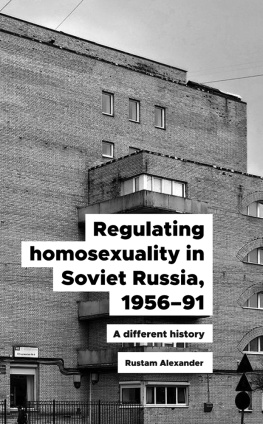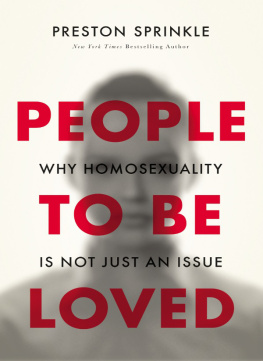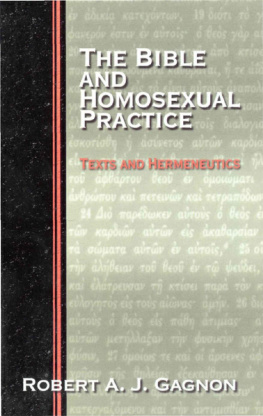
Copyright 2002 James R. White & Jeffrey D. Niell
Published by Bethany House Publishers
11400 Hampshire Avenue South
Bloomington, Minnesota 55438
www.bethanyhouse.com
Bethany House Publishers is a division of
Baker Publishing Group, Grand Rapids, Michigan.
www.bakerpublishinggroup.com
Ebook edition created 2012
All rights reserved. No part of this publication may be reproduced, stored in a retrieval system, or transmitted in any form or by any meanselectronic, mechanical, photocopying, recording, or otherwisewithout the prior written permission of the publisher and copyright owners.
ISBN 978-1-4412-1165-1
Library of Congress Cataloging-in-Publication Data is on file at the Library of Congress, Washington, DC.
Unless otherwise identified, Scripture quotations are taken from the NEW AMERICAN STANDARD BIBLE, Copyright The Lockman Foundation 1960, 1962, 1963, 1968, 1971, 1972, 1973, 1975, 1977, 1995. Used by permission. (www.Lockman.org)
Scripture quotations identified NKJV are from the New King James Version of the Bible. Copyright 1979, 1980, 1982, by Thomas Nelson, Inc., Publishers. Used by permission. All rights reserved.
Scripture quotations identified NRSV are from the New Revised Standard Version of the Bible, copyright 1989 by the Division of Christian Education of the National Council of Churches of Christ in the U.S.A. Used by permission. All rights reserved.
Cover design by Uttley/DouPonce Designworks
The internet addresses, email addresses, and phone numbers in this book are accurate at the time of publication. They are provided as a resource. Baker Publishing Group does not endorse them or vouch for their content or permanence.
This book is dedicated, with thankfulness, to the congregation of Emmanuel Covenant Church and in the hope that the church in our day will be strengthened to the glory of God. Let us never fear faithfulness to Gods Word.
Jeffrey D. Niell
CHAPTER ONE
The Unthinkable Has Become Thinkable
O ur culture is inundatedin print and on screenwith the idea that homosexuality is a normal, proper, and healthy expression of love between persons. This view has successfully infiltrated our TV sitcoms, magazines, bookstores, and coffee shops, but now we are being told that homosexualityin either orientation or actis something approved by God and therefore consistent with biblical morality. The growing number of proponents of this view tell us that the Bible (rightly understood, interpreted, or translated) does not condemn homosexuality and that it even contains examples of loving, committed homosexual relationships within its pages. We are witnesses of a desperate clamor to move the authority of the Bible to the side of those who claim that homosexuality is an acceptable, God-approved lifestyle.
The call to receive homosexuality as a morally acceptable belief, or belief and behavior, is now being heard in the church and by the church. The volume of this call is increasing as is the volume of books that are being produced. A proliferation of literature teaching this new morality under the guise of right understanding or proper biblical interpretation is resulting in the twisting of Scripture, the confusion of many, and the weakening of the church. With increasing vigor we are told that the previous ways are wrong and unenlightened. We are told that the Biblepreviously thought to condemn homosexualitydoes no such thing and that homosexuals (either in practice or merely in interest) need to be embraced by the church and allowed, if they so aspire, even to hold positions of authority in the church.
This push is evidence of a tragic cultural transformation that has occurred in recent decadesone that pertains to the ethical, to the moral, and to that which is right and wrong. Yesterdays outrage has become todays standard. Today, homosexuality, which at one time was morally unthinkable, is on parade before us as normal, acceptable, andin order to show its authoritative statusunquestionable. Francis Schaeffer wrote,
There is a thinkable and an unthinkable in every era. One era is quite certain intellectually and emotionally about what is acceptable. Yet another era decides that these certainties are unacceptable and puts another set of values into practice. On a humanistic base, people drift along from generation to generation, and the morally unthinkable becomes the thinkable as the years move on.
Schaeffer, writing in the 1970s, perceptively continued,
The thinkables of the eighties and nineties will certainly include things which most people today find unthinkable and immoral, even unimaginable and too extreme to suggest. Yetsince they do not have some overriding principle that takes them beyond relativistic thinkingwhen these become thinkable and acceptable in the eighties and nineties, most people will not even remember that they were unthinkable in the seventies. They will slide into each new thinkable without a jolt.
Schaeffer was not arguing that something is worthy of emulation simply because it was previously done. By itself, Dad and Moms conduct, while often qualitatively better and more polite than that of their children observed at the local mall, is not an adequate standard for morality. In fact, the point is that the basis of yesterdays morality was of such poor quality that it could not prevent its unthinkables from becoming thinkables in short order. One of yesterdays unthinkablesthe social and moral acceptance of homosexuality in both orientation and act, in both desire and deedis presented to us today as quite thinkable, and though we are speaking of morality and not the changing tides of fashion, our modern society can seldom tell the difference.
Furthermore, we must recognize with Schaeffer that this is the way things play out when performed upon a humanistic stage that views man (or, more precisely, self) as the lead characterthe measure of all things, the center of it alland casts God (if He even exists) in a subordinate role. In much of this discussion, God has been relegated to the periphery and man has taken His place. This practice is reflected in the quip God created man in His image, and ever since man has returned the favor. A humanistic approach to morality suffers from the immaculate perception that says, My ways are always right and everything else must fit. This approach has the effect (whether admitted or not) of viewing Gods standards of morality to be the equivalent of a wax nosecapable of being shaped according to the whim of the shaper. Wax nose morality renders Gods moral pronouncements to be temporary and optional. In all of this, Gods authority is questioned (Has God said?), and therefore, what God has declared about righteous behavior may make for nice history (for other people!) and perhaps exhibit keen insights from which we may glean some guidance, but is, according to this new (im-)morality, archaic and repressive. We are witnessing what happens when Gods absolute, authoritative standard is removed or redefined. Sliding into some kind of new morality, some kind of the unthinkable, and doing it without a jolt becomes easy.
H OMOSEXUALITY C ONSISTENT W ITH THE B IBLE ?
As noted above, however, this clamor for the acceptability of homosexuality, which is heard even in the church, is not without a stated authoritative base. The people making this claim appeal to the Bible and assert that a homosexual lifestyle is perfectly compatible with its teaching.

